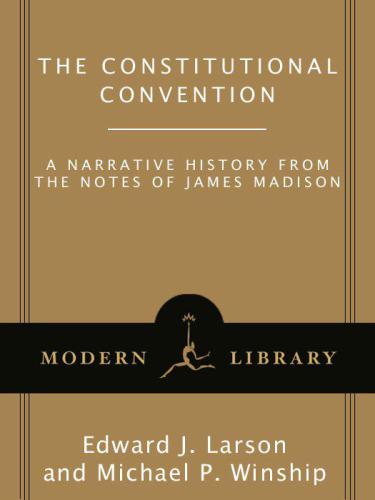
The Constitutional Convention
A Narrative History from the Notes of James Madison
کتاب های مرتبط
- اطلاعات
- نقد و بررسی
- دیدگاه کاربران
نقد و بررسی

September 19, 2005
In 1787, the fledgling American nation was in the throes of a serious economic depression, at least partly because the Articles of Confederation were too weak to make a stable republic. At the initiative of 36-year-old Virginian James Madison, delegates convened in Philadelphia that year to draft the much stronger U.S. Constitution. This book tells the convention's turbulent story in Madison's own words, drawn from the notes he took at the scene and giving us a daily blow-by-blow. Along the way, modern readers begin to understand just how much of the government's role was up for grabs. Should the executive be a single person, or was that too much like a monarchy? Would all members of Congress be elected by the people—a potentially dangerous and anarchic proposition—or would senators be appointed by the state legislatures? How would slaves be counted for government representation? Larson (a professor of history and law at the University of Georgia) and Winship (a professor of English at the University of Texas–Austin) steer readers through the fierce debates with helpful explanations and editorial asides, as well as a cogent epilogue, making this primary source far more than a tidy civics lesson.

November 1, 2005
The Constitutional Convention of 1787, which met to form the U.S. Constitution, was conducted in secret, with no official minutes. James Madison's private notes from the convention are thus the key source for determining back-and-forth debates concerning the structure of the national government and its relation to the states and the citizenry. Larson (history & law, Univ. of Georgia; "Summer for the Gods") and Winship (English, Univ. of Texas, Austin; "American Literary Publishing in the Mid-Nineteenth Century") have edited and annotated Madison's text, and the notes of other delegates, to clarify Madison's arguments. This book allows current audiences to understand the main controversies during the constitutional debates. The Constitution's ambiguous provisions are still a source of contemporary debate, as in the recent controversy about legislative-executive interactions regarding federal judicial appointments. Details of the original debates can be used to defend or to oppose current government decisions, particularly from individuals supporting -originalist - perspectives when interpreting the ratifiers' intentions. Readers should recall that the framers used terms and ideas that may be considered obscure by current standards. Larson and Winship seek to allow a general audience to overcome such obstacles in further understanding of the Constitutional Convention. Their book will be useful for larger public libraries." -Steven Puro, St. Louis Univ."
Copyright 2005 Library Journal, LLC Used with permission.

October 15, 2005
James Madison's record of the Constitutional Convention of 1787 has circulated since 1840 in various forms; this volume claims to be the "first abridged and annotated" edition. Addressing modern readers likely to become disoriented in the parliamentary thicket of the unexpurgated version, Larson and Winship distill the most salient differences that emerged in the convention--the representation of states in the national legislature, the form of the executive branch, and the status of slavery. The text thereby linked becomes more dramatic than the delegates' dry discussion of enumerated powers, as when at a contentious moment Benjamin Franklin unsuccessfully moved that the convention hire a minister to offer prayers. Delegates preferred nondivine assistance in their arguments, citing the history of republics, liberty's relation to human nature, or various parochial interests. Bringing forth the flow of deliberations around particular words, which regularly ignited strenuous debate, on slavery in particular, the editors instill both an understanding for the Constitution's underlying compromises and an appreciation for what a vital document Madison's record is.(Reprinted with permission of Booklist, copyright 2005, American Library Association.)

























دیدگاه کاربران